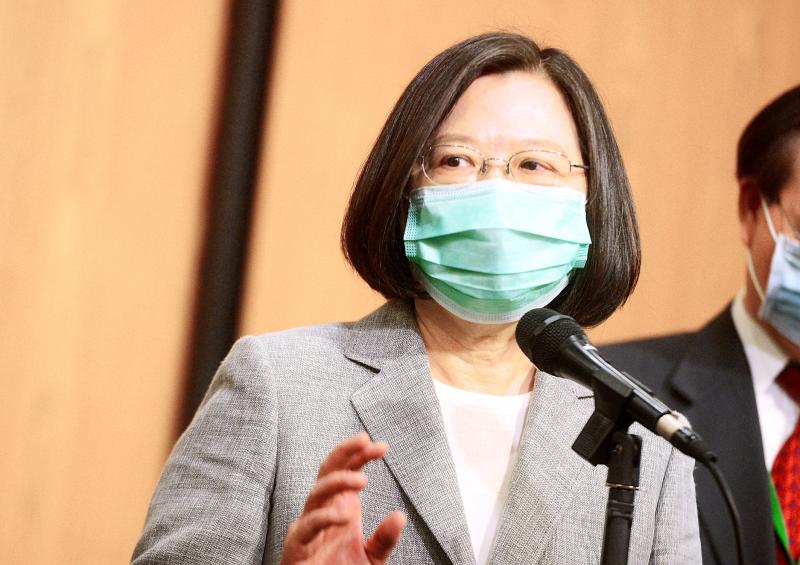The Taiwan-Hong Kong Services and Exchanges Office today officially opens, where it is to provide humanitarian assistance to Hong Kongers, after Beijing yesterday passed a controversial national security law for the territory.
President Tsai Ing-wen (蔡英文) expressed dismay over China’s passage of the law, saying that Beijing has broken its pledge to allow Hong Kong to maintain a high degree of autonomy for at least 50 years following its handover from the UK.
“I feel extremely disappointed [about the law’s passage], which means China did not keep its promise to Hong Kong,” Tsai said in Taipei.

Photo: CNA
Beijing’s “broken promise” also showed that the “one country, two systems” model for Hong Kong and Macau, which the Chinese government has also proposed for Taiwan, is not feasible for the nation, she said.
Tsai said she hoped that people in Hong Kong could continue to fight to maintain their freedoms, democracy and human rights after the law is implemented.
She again pledged that Taiwan would help Hong Kongers, citing the launch of the office to help those who want to come to Taiwan.
The office is to provide one-stop services for Hong Kongers who wish to study, do business, invest or seek asylum in Taiwan.
Although the office is new, the laws and guidelines related to the services provided are no more accommodating to people from Hong Kong than they were in the past.
The national security law is widely seen as an effort by the Chinese government to take full control of Hong Kong after a year of pro-democracy protests there.
In the Sino-British Joint Declaration signed by Britain and China in 1984, Beijing promised Hong Kong “a high degree of autonomy” for at least 50 years after China regained control of the territory in 1997.
“One country, two systems” refers to a constitutional principle formulated by then-Chinese leader Deng Xiaoping (鄧小平) in the early 1980s, who suggested that there would be only “one China,” but distinct Chinese regions, such as Hong Kong and Macau, could retain their own economic and administrative systems.
Meanwhile, Taipei Deputy Mayor Tsai Ping-kun (蔡炳坤) said that the city already has the resources to assist Hong Kongers wanting to work, study or live in Taipei.
The city has services in place to help new immigrants, and has now established an office specifically to assist newcomers from Hong Kong, he said, adding that Taipei has seen an influx of people from Hong Kong in the past few years.
In 2018, 4,148 people moved from Hong Kong to Taipei, and last year that number rose to 5,898, he said, adding that in the first four months of this year alone the figure was 2,383.
This story has been amended since it was first published.

CHAOS: Iranians took to the streets playing celebratory music after reports of Khamenei’s death on Saturday, while mourners also gathered in Tehran yesterday Iranian Supreme Leader Ayatollah Ali Khamenei was killed in a major attack on Iran launched by Israel and the US, throwing the future of the Islamic republic into doubt and raising the risk of regional instability. Iranian state television and the state-run IRNA news agency announced the 86-year-old’s death early yesterday. US President Donald Trump said it gave Iranians their “greatest chance” to “take back” their country. The announcements came after a joint US and Israeli aerial bombardment that targeted Iranian military and governmental sites. Trump said the “heavy and pinpoint bombing” would continue through the week or as long

TRUST: The KMT said it respected the US’ timing and considerations, and hoped it would continue to honor its commitments to helping Taiwan bolster its defenses and deterrence US President Donald Trump is delaying a multibillion-dollar arms sale to Taiwan to ensure his visit to Beijing is successful, a New York Times report said. The weapons sales package has stalled in the US Department of State, the report said, citing US officials it did not identify. The White House has told agencies not to push forward ahead of Trump’s meeting with Chinese President Xi Jinping (習近平), it said. The two last month held a phone call to discuss trade and geopolitical flashpoints ahead of the summit. Xi raised the Taiwan issue and urged the US to handle arms sales to

BIG SPENDERS: Foreign investors bought the most Taiwan equities since 2005, signaling confidence that an AI boom would continue to benefit chipmakers Taiwan Semiconductor Manufacturing Co’s (TSMC, 台積電) market capitalization swelled to US$2 trillion for the first time following a 4.25 percent rally in its American depositary receipts (ADR) overnight, putting the world’s biggest contract chipmaker sixth on the list of the world’s biggest companies by market capitalization, just behind Amazon.com Inc. The site CompaniesMarketcap.com ranked TSMC ahead of Saudi Aramco and Meta Platforms Inc. The Taiwanese company’s ADRs on Tuesday surged to US$385.75 on the New York Stock Exchange, as strong demand for artificial intelligence (AI) applications led to chip supply constraints and boost revenue growth to record-breaking levels. Each TSMC ADR represents

Pro-democracy media tycoon Jimmy Lai’s (黎智英) fraud conviction and prison sentence were yesterday overturned by a Hong Kong court, in a surprise legal decision that comes soon after Lai was jailed for 20 years on a separate national security charge. Judges Jeremy Poon (潘兆初), Anthea Pang (彭寶琴) and Derek Pang (彭偉昌) said in the judgement that they allowed the appeal from Lai, and another defendant in the case, to proceed, as a lower court judge had “erred.” “The Court of Appeal gave them leave to appeal against their conviction, allowed their appeals, quashed the convictions and set aside the sentences,” the judges